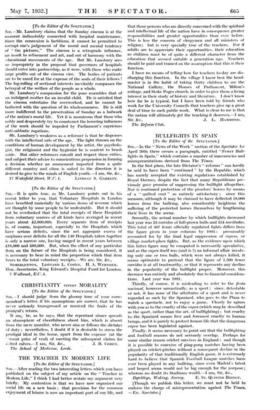[To the Editor of the SPECTATOR.] Lansbury claims that the
Sunday cinema is at the moment indissolubly connected with hospital maintenance. Since the connexion is factitious, it cannot be permitted to corrupt one's judgement of the moral and mental tendency of the pictures." The cinema is a retrograde influence, an insult to refinement and art, and out of harmony with the edueational movements of .the age. But Mr. Lansbury sees no impropriety in the proposal that governors of hospitals should enter into partnership, as it were, with those who make large profits out -of the cinema vice. The bodies of patients are to be cared for at the expense of the souls of their fellows ! The log-rolling of sectional interests inevitably compasses-the betrayal of the welfare of the people as a whole.
Mr. Lansbury's compassion for the poor resembles that of an indulgent mother for an invalid child. He is satisfied that the cinema entertains the overworked, and he cannot be bothered with the question of its wholesomeness. He is still more indifferent to the preservation of Sunday as a bulwark of the nation's moral life. Yet it is monstrous that those who nobly and desperately try to counteract the lowering influences of the week should be impeded by Parliament's capricious anti-sabbatic rogations. - Mr. Lansbury's weakness as a reformer is that he dispenses with the intellectual aids of the age. The light thrown on the conditions of human development by the artist, the psycholo- gist, the religionist and the hygienist he is content to brush aside. But other reformers consult and respect these critics, and subject their advice to conscientious perpension in forming a decision whether an amusement imported from a quite different country and clime is suited to the direction it is desired to give to the minds of English youth.—I am, Sir, &c.,






































 Previous page
Previous page